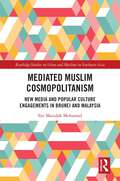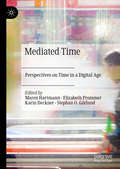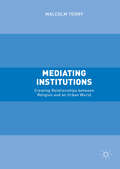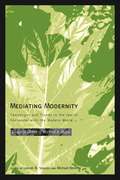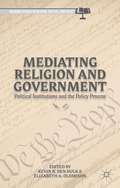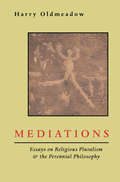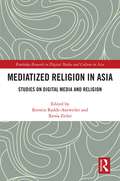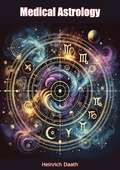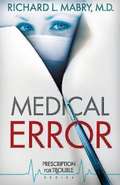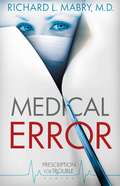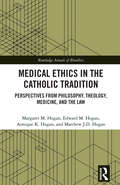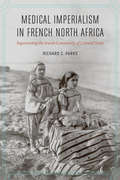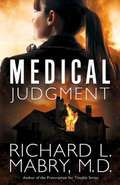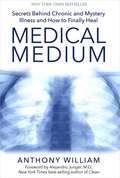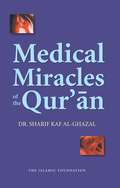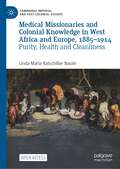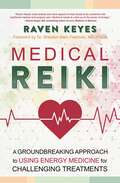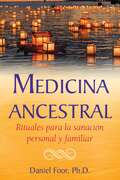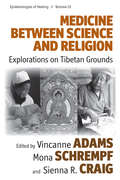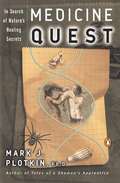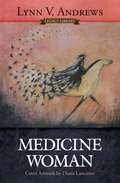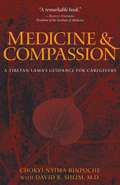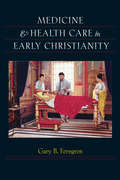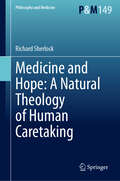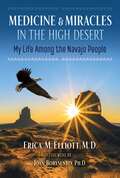- Table View
- List View
Mediated Muslim Cosmopolitanism: New Media and Popular Culture Engagements in Brunei and Malaysia (Routledge Studies on Islam and Muslims in Southeast Asia)
by Siti Mazidah MohamadMohamad examines the day-to-day experience of virtual and non-tangible mobilities of young Bruneian Malay Muslim and Malaysians, as enabled by popular culture and digital media. Cosmopolitanism has garnered interest from sociology, political studies, religious studies, geography, and education scholars. Despite this, there are three gaps in the study of Muslim cosmopolitanism. Firstly, young Muslims' cosmopolitanism in the digital age has not been intensively studied. Secondly, existing research overlooks Southeast Asia, especially Brunei Darussalam. Thirdly, the focus has not sufficiently engaged with popular culture and new media. This book addresses these gaps by exploring the everyday lives of Bruneian Malay Muslim and Malaysian youths, shaped by local, transcultural, and global practices. It expands the Muslim cosmopolitanism concept by examining the daily concerns, challenges, and practices these youths experience, offering new forms of mediated Muslim cosmopolitanism. Grounded in robust empirical data from two extensive research projects (2010-2024), this book employs diverse research approaches (ethnography and phenomenology) and methods (Qualitative Content Analysis and Interviews), ensuring reliable and in-depth findings.Scholars in geography, sociology, religious studies, and youth studies will find this book invaluable for its insights into cosmopolitanism, popular culture, new media, digital youth, and contemporary Southeast Asia.
Mediated Time: Perspectives on Time in a Digital Age
by Maren Hartmann Elizabeth Prommer Karin Deckner Stephan O. GörlandExploring mediated time, this book contemplates how far (and in what ways) media and time are intertwined from a diverse set of theoretical and empirical angles. It builds from theoretical discussions concerning the question of mediation and the normative framing of time (especially acceleration) and works its way through questions of time for/of one’s own, resisting temporalities, polychronicity, in-between-time, simultaneity and other time concepts. It further examines specific time frames, imaginations of a media future and the past, questions of online journalism and multitasking or liveness. Bringing together authors from diverse backgrounds, this collection presents a rich combination of milestone articles, new empirical research, enriching theoretical work and interviews with leading researchers to bridge sociology, media studies, and science and technology studies in one of the first book-length publications on the emerging field of media and time.
Mediating Institutions
by Malcolm TorryThis original book studies a wide variety of mediating institutions, both organizational and non-organizational, in workplaces, residential areas, and in wider society. Focusing upon institutions in the Thames Gateway and with case studies across south-east London, Europe and the USA, Meditating Institutions highlights the importance of understanding, creating and maintaining these organizations that facilitate relationships between religious institutions and others within society. Discussing their structures and activities, the author asserts that good relationships between religious institutions and other groups in our society are essential for a cohesive and peaceful society.
Mediating Modernity: Challenges and Trends in the Jewish Encounter with the Modern World
by Michael Brenner Lauren B. StraussIn Mediating Modernity, contemporary Jewish scholars pay tribute to Michael A. Meyer, scholar of German-Jewish history and the history of Reform Judaism, with a collection of essays that highlight growing diversity within the discipline of Jewish studies. The occasion of Meyer's seventieth birthday has served as motivation for his colleagues Lauren B. Strauss and Michael Brenner to compile this volume, with essays by twenty-four leading academics, representing institutions in five countries. Mediating Modernity is introduced by an overview of modern Jewish historiography, largely drawing on Meyer's work in that field, delineating important connections between the writing of history and the environment in which it is written. Meyer's own areas of specialization are reflected in essays on Moses Mendelssohn, German-Jewish historiography, the religious and social practices of German Jews, Reform Judaism, and various Jewish communities in America. The volume's field of inquiry is broadened by essays that deal with gender issues, literary analysis, and the historical relationship of Israel and the Palestinians. Though other volumes have been compiled to honor Jewish historians, Mediating Modernity is unique in the personal and intellectual relationships shared by its contributors and Michael A. Meyer. Scholars of Jewish studies, German history, and religious history will appreciate this timely volume.
Mediating Religion and Government
by Kevin R. Den Dulk Elizabeth A. OldmixonThe study of religion and politics is a strongly behavioral sub-discipline, and within the American context, scholars place tremendous emphasis on its influence on political attitudes and behaviors, resultuing in a better understanding of religion's ability to shape voting patterns, party affiliation, and views of public policy.
Mediations
by Harry OldmeadowThe unprecedented collision of religions in the contemporary world creates both dangerous antagonism and new possibilities for spiritual growth and renewal. Such possibilities can only be realized through a reaffirmation of the perennial philosophy, which celebrates religious diversity while recognizing that all integral tradition are informed by the same universal principles and values. Mediations examines the ways in which some of the 20th century's most prescient thinkers have responded to the challenges of religious pluralism. It present an overview of the prre-eminint modern perennials--René Guénon, Ananda Coomaraswamy, and Frithjof Schuon--and explores the contribution made to inter-religious understanding by figures as diverse as Carl Jung, Rudolf Otto, Mircea Eliade, Allen Ginsberg, and Swami Abhishiktananda. These provocative essays are addressed of a harmonious world community which cherishes our differences whilst affirming that Wisdom of the Ages which is the patrimony of all humankind. In opening his rare and unique collection of essays, one meets an ancient and eternal world inhabited by the remarkable men who endeavored to come to terms with that world by describing its inscrutable mystery. Focusing on an eclectic representation of writers, from René Guénon and Frithjof Schuon writing on the perennial philosophy to Jung and Eliade who changed the theoretical landscapes of psychology and comparative religion respectively, Harry Oldmeadow has successfully brought together the lives and thoughts of prominent 20th century philosophers and thinkers within a single volume that sheds unexpected light on hidden crystals. --John Herlihy, author of Borderlands of the Spirits, etc. The great confusion of our times sterns from the accelerating centrifugal forces of flight from the Absolute, and from the illusionary influences that seek to reify the Absolute Reality whose principial unity transcends the diversity of its multiple forms. Professor Oldmeadow's essays are an excellent introduction to the great traditionalist metaphysicians of the last century, and to other teachers who, while not strictly within the traditionalist school, have timely lessons to teach us about the basis of a principled pluralism that can light our passage out of the darkening shadows that threaten to engulf us. --Ali Lakhani, editor, Sacred Web Once again Harry Oldmeadow enlightens and delights us with his definitive biographical studies relating to the encounter of East and West.--Wolfgang Smith, author of Cosmos & Transcendence, etc.
Mediatized Religion in Asia: Studies on Digital Media and Religion (Routledge Research in Digital Media and Culture in Asia)
by Kerstin Radde-Antweiler Xenia ZeilerThis edited volume discusses mediatized religion in Asia, examining the intensity and variety of constructions and processes related to digital media and religion in Asia today. Individual chapters present case studies from various regions and religious traditions in Asia, critically discussing the data collected in light of current mediatization theories. By directing the study to the geographical, cultural and religious contexts specific to Asia, it also provides new material for the theoretical discussion of the pros and cons of the concept mediatization, among other things interrogating whether this concept is useful in non-’Western’ contexts."
Medical Astrology
by Heinrich Daath"Medical Astrology" by Heinrich Daath is an authoritative and illuminating exploration of the ancient practice of using astrology to understand and influence health and well-being. Daath, a distinguished astrologer and scholar, bridges the gap between traditional astrological wisdom and modern medical knowledge, offering readers a comprehensive guide to the principles and applications of medical astrology.In this profound work, Daath delves into the intricate relationships between the celestial bodies and human health. He explains how the positions and movements of the planets can affect physical and mental health, providing insights into the underlying causes of various ailments and conditions. Through detailed explanations and practical guidance, Daath demonstrates how to interpret astrological charts to gain a deeper understanding of individual health profiles and potential predispositions."Medical Astrology" also includes historical context, tracing the roots of medical astrology in various cultures and highlighting its evolution and relevance in contemporary holistic health practices. Daath emphasizes the importance of integrating astrological insights with modern medical knowledge to achieve a balanced and effective approach to health and healing.Heinrich Daath's "Medical Astrology" is a must-read for astrologers, holistic health practitioners, and anyone interested in the powerful connections between the cosmos and human health. It stands as a testament to the enduring wisdom of medical astrology and its potential to enhance our understanding of health and well-being.
Medical Error
by Richard L. MabryDr. Anna McIntyre's life was going along just fine until someone else started living it. Her patient died because of an identity mix-up, her medical career is in jeopardy because of forged prescriptions, and her credit is in ruins. She thought things couldn't get worse, but that was before she opened the envelope and saw a positive HIV test with her name on it. Her allies are two men who are also competing for her affection. Dr. Nick Valentine is a cynic who carries a load of guilt. Attorney Ross Donovan is a recovering alcoholic. The deeper Anna digs to discover who's behind the identity thefts, the higher the stakes. Finally, when her life is on the line, Anna finds that her determination to clear her name might have been a prescription for trouble.
Medical Error
by Richard L. MabryDr. Anna McIntyre's life was going along just fine until someone else started living it. Her patient died because of an identity mix-up, her medical career is in jeopardy because of forged prescriptions, and her credit is in ruins. She thought things couldn't get worse, but that was before she opened the envelope and saw a positive HIV test with her name on it. Her allies are two men who are also competing for her affection. Dr. Nick Valentine is a cynic who carries a load of guilt. Attorney Ross Donovan is a recovering alcoholic. The deeper Anna digs to discover who's behind the identity thefts, the higher the stakes. Finally, when her life is on the line, Anna finds that her determination to clear her name might have been a prescription for trouble.
Medical Ethics in the Catholic Tradition: Perspectives from Philosophy, Theology, Medicine, and the Law (Routledge Annals of Bioethics)
by Margaret M. Hogan Edward M. Hogan Annique K. Hogan Matthew J.D. HoganThis book is a comprehensive survey and a sustained treatment of the major topics in contemporary medical ethics from within the Roman Catholic tradition. It brings together perspectives from philosophy, theology, medicine, and law to explore the traditions that undergird Catholic medical ethics.The authors of this book are, respectively, a philosopher, theologian, physician, and attorney. Their commitment to the Roman Catholic tradition provides the foundational principles for addressing a wide range of issues in contemporary medical ethics. These topics include abortion, reproduction, cloning to produce children, cloning for biomedical research, embryonic stem cell use, genetics as screening, testing, therapy, enhancement, engineering, specific special relations such as maternal/fetal, physician/patient, mentally ill/caretakers, health care, and end of life issues. Furthermore, the book elaborates on the ways in which the authors’ professions and disciplines act in service to medicine as an instrument for real human flourishing.Medical Ethics in the Catholic Tradition is for the physician who would like to know more about the philosophical/theological/legal traditions that undergird the Catholic position. It is for the attorney who would like to know more about the philosophical/theological/medical traditions that undergird the Catholic position. Similarly, the philosopher or theologian can find here the appropriate information to understand how science and law contribute to the development of the Catholic position on major issues in medical ethics.
Medical Imperialism in French North Africa: Regenerating the Jewish Community of Colonial Tunis (France Overseas: Studies in Empire and Decolonization)
by Richard C. ParksFrench-colonial Tunisia in the late nineteenth and early twentieth centuries witnessed shifting concepts of identity, including varying theories of ethnic essentialism, a drive toward “modernization,” and imperialist interpretations of science and medicine. As French colonizers worked to realize ideas of a “modern” city and empire, they undertook a program to significantly alter the physical and social realities by which the people of Tunisia lived, often in ways that continue to influence life today.Medical Imperialism in French North Africa demonstrates the ways in which diverse members of the Jewish community of Tunis received, rejected, or reworked myriad imperial projects devised to foster the social, corporeal, and moral “regeneration” of their community. Buttressed by the authority of science and medicine, regenerationist schemes such as urban renewal projects and public health reforms were deployed to destroy and recast the cultural, social, and political lives of Jewish colonial subjects. Richard C. Parks expands on earlier scholarship to examine how notions of race, class, modernity, and otherness shaped these efforts. Looking at such issues as the plasticity of identity, the collaboration and contention between French and Tunisian Jewish communities, Jewish women’s negotiation of social power relationships in Tunis, and the razing of the city’s Jewish quarter, Parks fills the gap in current literature by focusing on the broader transnational context of French actions in colonial Tunisia.
Medical Judgment: Patient-centered Collaborative Care
by Richard L. Mabry M.D.Someone is after Dr. Sarah Gordon. They’ve stalked her and set a fire at her home. Trying to recover from the traumatic deaths of her husband and infant daughter is tough enough, but she has no idea what will come next. Her late husband’s best friend and a recovering alcoholic detective are trying to solve the mystery before it’s too late, but both appear to be vying for her affection as well. Sarah finds herself in constant fear as the process plays out. As the threats on her life continue to escalate, so do the questions: Who is doing this? Why are they after her? And with her only help being unreliable suitors in competition with each other, whom can she really trust?
Medical Medium: Secrets Behind Chronic And Mystery Illness And How To Finally Heal
by Anthony WilliamAnthony William, the one and only Medical Medium, has helped tens of thousands of people heal from ailments that have been misdiagnosed or ineffectively treated or that doctors can't resolve. He's done this by listening to a divine voice that literally speaks into his ear, telling him what lies at the root of people's pain or illness and what they need to do to restore their health. His methods achieve spectacular results, even for those who have spent years and many thousands of dollars on all forms of medicine before turning to him. Now, in this revolutionary book, he opens the door to all he has learned in over 25 years of bringing people's lives back: a massive amount of healing information, much of which science won't discover for decades, and most of which has never appeared anywhere before. In his New York Times best-selling book, Medical Medium, he reveals the root causes of diseases and conditions that medical communities either misunderstand or struggle to understand at all. It explores all-natural solutions for dozens of the illnesses that plague us, including Lyme disease, fibromyalgia, adrenal fatigue, chronic fatigue syndrome, hormonal imbalances, Hashimoto's disease, multiple sclerosis, depression, neurological conditions, chronic inflammation, autoimmune disease, blood sugar imbalances, colitis and other digestive disorders, and more. It also offers solutions for restoring the soul and spirit after illness has torn at our emotional fabric. Whether you've been given a diagnosis you don't understand, or you have symptoms you don't know how to name, or someone you love is sick, or you want to care for your own patients better,Medical Medium offers the answers you need. It's also a guidebook for everyone seeking the secrets to living longer, healthier lives. "The truth about the world, ourselves, life, purpose--it all comes down to healing," Anthony William writes. "And the truth about healing is now in your hands. "
Medical Miracles of the Qur'an
by Sharif Kaf Al-GhazalThis book explores some of the Qur'anic references to the medicine and science in the light of the latest scholarship. The Qur'an repeatedly asks man to reflect on the signs of Allah in his own being and around him. Taking the cue from this directive, the Qur'anic allusions to medicine and science are elucidated in this work.
Medical Missionaries and Colonial Knowledge in West Africa and Europe, 1885-1914: Purity, Health and Cleanliness (Cambridge Imperial and Post-Colonial Studies)
by Linda Maria Ratschiller NasimThis open access book offers an entangled history of hygiene by showing how knowledge of purity, health and cleanliness was shaped by evangelical medical missionaries and their encounters with people in West Africa. By tracing the interactions and negotiations of six Basel Mission doctors, who practised on the Gold Coast and in Cameroon from 1885 to 1914, the author demonstrates how notions of religious purity, scientific health and colonial cleanliness came together in the making of hygiene during the age of High Imperialism. The heyday of evangelical medical missions abroad coincided with the emergence of tropical medicine as a scientific discipline during what became known as the Scramble for Africa. This book reveals that these projects were intertwined and that hygiene played an important role in all three of them. While most historians have examined modern hygiene as a European, bourgeois and scientific phenomenon, the author highlights both the colonial and the religious fabric of hygiene, which continues to shape our understanding of purity, health and cleanliness to this day.
Medical Reiki: A Groundbreaking Approach to Using Energy Medicine for Challenging Treatments
by Raven KeyesAn Integrative System of Energy Medicine for Patients Undergoing Intense Medical ProceduresScience-based medicine is finally ready to embrace the use of Medical Reiki. This phenomenal book reveals groundbreaking energy practices that can activate the parasympathetic nervous system and accelerate the effectiveness of serious treatments like surgery and chemotherapy. Having worked in operating rooms alongside surgeons for nearly two decades, Reiki Master Raven Keyes is uniquely qualified to share techniques for helping patients feel whole and free of stress that can impede their healing. Raven shares how to request and receive Medical Reiki, how physicians can open their practice to it, and how to use exercises, meditations, and affirmations for further healing. Medical Reiki is essential to the evolution of patient care.Includes a foreword by Dr. Sheldon Marc Feldman, MD, FACS, director of breast cancer services at Montefiore Medical Center
Medicina ancestral: Rituales para la sanación personal y familiar
by Daniel Foor• Proporciona ejercicios y rituales para iniciar el contacto con tus antepasados, encontrar guías ancestrales y ayudar a los fallecidos que aún no están en paz • Explica cómo emprender el trabajo de reparación del linaje de forma segura, al conectar con tus antepasados más antiguos antes de relacionarte con los recién fallecidos • Explora cómo tus antepasados pueden ayudarte a transformar los legados intergeneracionales de dolor y abuso, así como a recuperar el espíritu positivo de la familia Todos tenemos antepasados sabios a quienes podríamos invocar para recibir apoyo. Daniel Foor detalla cómo relacionarse con antepasados a través de ejercicios basados en antiguas tradiciones de sabiduría para iniciar el contacto, encontrar guías de apoyo, armonizar tus líneas de sangre y ayudar a los fallecidos que aún no están en paz. La guía muestra cómo recuperar las bendiciones y dones de los linajes para lograr avances curativos de los miembros vivos y librar a las generaciones futuras de cargas ancestrales. Foor describe formas de honrar a los ancestros, abordar visitas oníricas de los muertos, trabajar con santuarios y llevar a cabo ritos funerarios. A través de la reverencia a los antepasados descubrirás cómo mantener las conexiones con familiares queridos después de su muerte y entender mejor la relación entre los vivos y los muertos.
Medicine Between Science And Religion: Explorations on Tibetan Grounds (Epistemologies of Healing #10)
by Sienna R. Craig Vincanne Adams Mona SchrempfThere is a growing interest in studies that document the relationship between science and medicine - as ideas, practices, technologies and outcomes - across cultural, national, geographic terrain. Tibetan medicine is not only known as a scholarly medical tradition among other Asian medical systems, with many centuries of technological, clinical, and pharmacological innovation; it also survives today as a complex medical resource across many Asian nations - from India and Bhutan to Mongolia, Tibet (TAR) and China, Buryatia - as well as in Western Europe and the Americas. The contributions to this volume explore, in equal measure, the impacts of western science and biomedicine on Tibetan grounds - i.e., among Tibetans across China, the Himalaya and exile communities as well as in relation to globalized Tibetan medicine - and the ways that local practices change how such "science" gets done, and how this continually hybridized medical knowledge is transmitted and put into practice. As such, this volume contributes to explorations into the bi-directional flows of medical knowledge and practice.
Medicine Quest: In Search Of Nature's Healing Secrets
by Mark PlotkinIn Medicine Quest, Mark Plotkin moves beyond the Amazon rainforests of his classic Tales of a Shaman's Apprentice to describe the ongoing race to find new medicines for intractable diseases such as AIDS, cancer, diabetes, and tuberculosis in far-flung places all over the world. While highlighting the unlikely marriage of natural products, indigenous wisdom, and biotechnology, Plotkin details discoveries that are producing stunning results in the laboratory: painkillers from the skin of rainforest frogs, anticoagulants from leech saliva, and antitumor agents from snake venom. An entertaining and educational weave of medicine, ecology, ethnobotany, history, exploration, and adventure, Medicine Quest will thrill scientists, naturalists, and armchair explorers, and heighten our appreciation for the inexhaustible therapeutic potential of our natural world.
Medicine Woman (Medicine Woman Series)
by Lynn V. AndrewsThe first in the late Lynn Andrews&’s widely popular and visionary Medicine Woman series, this book will encourage you to find your own sacred feminine power.Join Lynn V. Andrews in her pivotal book Medicine Woman, following her journey as an American Indian art collector turned shaman initiate. While visiting an art gallery in Beverly Hills, Lynn sees an image of a rare American Indian basket, which immediately captivates her and haunts her dreams. Upon calling the gallery the following day, she finds that it has mysteriously disappeared. Through a series of serendipitous events, Lynn eventually finds herself in the wilderness of Manitoba to locate a Cree woman named Agnes Whistling Elk, who is said to know the location of the sacred marriage basket and could help Lynn retrieve it. But once up north, Lynn finds more than she bargained for. The evil shaman Red Dog has stolen the marriage basket from Agnes. Agnes asks fellow wise woman Ruby Plenty Chiefs to help her teach Lynn their sacred ways before she attempts to steal it back. From there, Lynn is instructed to become a huntress, invite her wolf-self forward to better serve her on her mission, and to learn to embrace her own sacred medicine. Will Lynn find the feminine power within herself in time to face and defeat Red Dog once and for all?
Medicine and Compassion
by Erik Pema Kunsang Harvey Fineberg Donald Fineberg Chokyi Nyima Rinpoche David R ShlimIt is estimated that some 54 million people in the U.S. act as informal caregivers for ill or disabled loved ones. We can add to these countless workers in the fields of health and human service, and yet there is still not enough help to go around: as many as three fourths of our informal caregivers report "going it alone." It's no wonder that "caregiver burnout" and depression afflict so many. Sure to be welcomed by caregivers of all types, the groundbreaking new Medicine and Compassion can help anyone reconnect with the true spirit of their caregiving task. In a clear and very modern voice, Chokyi Nyima Rinpoche and Dr. David R. Shlim use the teachings of Tibetan Buddhist philosophy to present practical tools for revitalizing the caring spirit. Readers, in turn, will find their patience, kindness, and effectiveness re-energized. Offering practical advice on dealing with people who are angry at their medical conditions or their care providers, people who are dying, or the families of those who are critically ill, Medicine and Compassion will strike resonant cords with medical professionals, hospice workers, teachers and parents of children with special needs, and those caring for aging and infirm loved ones.
Medicine and Health Care in Early Christianity
by Gary B. FerngrenDrawing on New Testament studies and recent scholarship on the expansion of the Christian church, Gary B. Ferngren presents a comprehensive historical account of medicine and medical philanthropy in the first five centuries of the Christian era.Ferngren first describes how early Christians understood disease. He examines the relationship of early Christian medicine to the natural and supernatural modes of healing found in the Bible. Despite biblical accounts of demonic possession and miraculous healing, Ferngren argues that early Christians generally accepted naturalistic assumptions about disease and cared for the sick with medical knowledge gleaned from the Greeks and Romans.Ferngren also explores the origins of medical philanthropy in the early Christian church. Rather than viewing illness as punishment for sins, early Christians believed that the sick deserved both medical assistance and compassion. Even as they were being persecuted, Christians cared for the sick within and outside of their community. Their long experience in medical charity led to the creation of the first hospitals, a singular Christian contribution to health care.
Medicine and Hope: A Natural Theology of Human Caretaking (Philosophy and Medicine #149)
by Richard SherlockThis book expands, in a modest way, the discussion of hope and does so by focusing on a field where it is at the core of care-taking: medicine. The three great religious virtues of medieval theology were faith, hope, and love. An enormous literature exists about faith and love, but much less exists about hope. Doctors often know what they want to do for a patient but do not know whether they are able to have a good result. If they fail, will the result be worse? They must hope they can succeed. In other cases, they know what they can do but they are uncertain whether they should. If they do not undertake action, will the patient try to do it themselves with a much worse result? Questions such as these raise the issue of the importance of hope in medicine. This book builds on an insight from the first modern textbook of medical ethics, Thomas Percival’s 1803 classic Medical Ethics. There Percival says that the doctor is a “minister of hope to the sick”. This book analyses this concept, which is central to the practice of medicine.
Medicine and Miracles in the High Desert: My Life among the Navajo People
by Erica M. Elliott• Details the author&’s time living with the Navajo people as a teacher, sheepherder, and doctor and her profound experiences with the people, animals, and spirits • Shows how she learned the Navajo language to bridge the cultural divide • Reveals the miracles she witnessed, including her own miracle when the elders prayed for healing of a tumor on her neck • Shares her fearsome encounters with a mountain lion and a shape-shifting &“skin walker&” and how she fulfilled a prophecy by returning as a doctor In 1971, Erica Elliott arrived on the Navajo reservation as a newly minted schoolteacher, knowing nothing about her students or their culture. After a discouraging first week, she almost leaves in despair, unable to communicate with the children or understand cultural cues. But once she starts learning the language, the people begin to trust her, welcoming her into their homes and their hearts. As she is drawn into the mystical world of Navajo life, she has a series of profound experiences with the people, animals, and spirits of Canyon de Chelly that change her life forever.In this compelling memoir, the author details her time living with the Navajo, the Diné people, and her experiences with their enchanting land, healing ceremonies, and rich traditions. She shares how her love for her students transformed her life as well as the lives of the children. She reveals the miracles she witnessed during this time, including her own miracle when the elders prayed for healing of a tumor on her neck. She survives fearsome encounters with a mountain lion and a shape-shifting &“skinwalker.&” She learns how to herd sheep, make fry bread, and weave traditional rugs, experiencing for herself the life of a traditional Navajo woman.Fulfilling a Navajo grandmother&’s prophecy, the author returns years later to serve the Navajo people as a medical doctor in an underfunded clinic, delivering numerous babies and treating sick people day and night. She also reveals how, when a medicine man offers to thank her with a ceremony, more miracles unfold. Sharing her life-changing deep dive into Navajo culture, Erica Elliott&’s inspiring story reveals the transformation possible from immersion in a spiritually rich culture as well as the power of reaching out to others with joy, respect, and an open heart.
